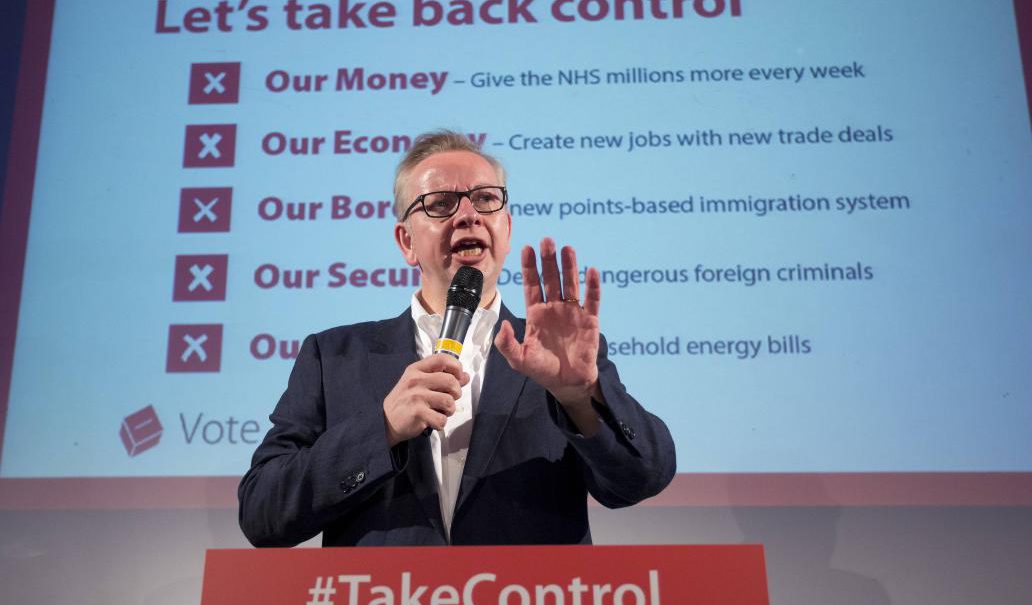The delusion of economic sovereignty

Image: Isabel Infantes / EMPICS Entertainment. All rights reserved.
A recent post on Social Europe made some interesting points about the comparative process of policy development within the EU and bilateral trade negotiations. It stressed the benefits of the former in that national governments are integral to the development of trade and other regulations along with their partners whereas in bilateral trade negotiations. For example, between the US and the UK following Brexit the British would be junior partners and have limited options to determine the outcome. Undoubtedly true but the analysis even within the limited structure discussed simply did not go far enough. While lobbyists have a happy hunting ground in Brussels (and nationally) they are weak in comparison with their counterparts in the USA.
Thus in any trade negotiations with the US inevitably the UK would have to accept regulations relating to production and trade that are largely the outcome of corporate pressures which embody their interests at the expense of consumers. One has only to look at the funding mechanisms for the US Food and Drug Administration i.e. it is funded by the industry, and its failures to regulate effectively to be extremely concerned about probable outcomes of any bilateral trade agreement between the US and the UK. It is worth noting that at EU level the UK has been less interested in effective regulation than most other countries preferring less control by the EU vis a vis US multinationals.
But the issues are much broader than those discussed by Professor Crouch in Social Europe and it is worth looking in some detail at the whole issue of economic sovereignty since supposedly one of the aims of Brexit is to restore this in the United Kingdom. Even the following brief analysis of the economic structure of the UK shows that it is unachievable and is simply pie in the sky.
It has been Tory policy since Mrs Thatcher to reduce the size of the state in pursuit of some golden age where private ownership and management of more or less everything would dominate. For a review of this policy strategy and its outcomes everyone should read James Meek’s ‘Private Island: Why Britain Belongs to Someone Else’. The scale of the dismantling of the state and the destruction of what Meek calls ‘universal networks’ – the social and technological system deemed essential to all citizens independently of their ability to pay yet able to draw down – has been extraordinary. As Meek concludes:
“The most absurd paradox of Britain’s privatisation is that it has actually led to the nationalisation of British infrastructure by foreign governments with parts of former British state firms becoming the property of the governments of France, the Netherlands, Sweden, China, Singapore and Abu Dhabi”
Even the most basic services such as water, electricity, gas and public transport have been transferred into private ownership, and since in most cases these are natural monopolies and/or behave as collusive oligopolists they have been able to function as tax farmers. They have in fact substituted for Government and their pricing activities are analogous to levying taxes on consumers who have little or no alternative.
The most egregious example of this is water and sanitation where the privatised owners, who are mostly foreign, have fully exploited their economic power through their pricing policies. They are moreover in many cases now privately-owned companies – they are no longer quoted on the stock exchange but owned by pension funds in Canada, Australia and the Netherlands. These are managed through subsidiaries located in tax havens where they pay themselves huge management fees. Whereas supposedly a major aim of all of these privatisations was said to be to maximise individual share ownership in the UK, in practice the level of this fell from 40% before Thatcher came to office in 1979 to under 12% now.
British Governments since Thatcher have been totally disinterested in who owns what unlike most other countries which have had strategic objectives concerning the importance of ownership and control. The result is that most of the major industries are partially or wholly owned by foreign enterprises – including automobiles, pharmaceuticals, ports and airports, banking and finance and electronics. It is not that foreign ownership is in itself a bad thing but to argue that Brexit will permit the UK to re-establish economic sovereignty is simply a chimera. It is simply not going to happen.
Indeed it is totally unclear what economic sovereignty means in a globalised world. UK is a very open economy with a ratio of Imports and exports to GDP of 61% and rising, while it was 51% in 2003. This is one of the highest ratios of any of the G8 countries. How is it possible for an economy so dependent on trade in goods and services to recover its economic sovereignty given this extremely high dependence on imports both for consumption and for production? One of the results of joining the EU has been greater specialisation in production and further integration in industry with obvious benefits in terms of efficiency, prices and quality. It is worth noting that the import content of UK exports is extremely high at 23%, which is a further indicator of dependence on trade for both output and employment. Membership of the EU gives the UK greater control in these circumstances over imports since the UK participates in all bodies involved in regulation.
It is only recently that the impact of Brexit on food security in the UK has been identified and been the subject of discussion (see for example A Food Brexit: Time to get real). In part as a result of membership of the EU and in part due to rising incomes and population the UK is now much more dependent on food imports. Some 40 % of total food needs is presently imported and it is totally unclear how this dependence on trade could or should be reduced. There is little capacity in the UK for the substitution of local supplies for imported food and anything that threatened imports would have severe consequences for food security and health. The range of foods consumed has expanded dramatically since joining the EU and it is difficult to envisage returning to a diet of carrots, parsnips and peas.
It goes without saying that it is not only food supplies that are potentially threatened by Brexit but other aspects of security as well. The UK has been dependent on NATO for its post-war security and will presumably continue to be so. With the caveat that recent statements by the US imply that Europe will have to provide more resources for defence and inevitably this will involve the UK. Thus security underlies economic sovereignty and UK is dependent on allies for this including imports of essential equipment, especially from the US. One of the least noted effects of the fall in the sterling exchange rate after the Brexit referendum has been a rise in the cost of imported military equipment and a sharp rise in defence costs both now and in the near future.
As noted above the UK is a highly open economy and yet the price at which trade takes place is only tenuously in the control of the British monetary authorities. The exchange rate of sterling against both the $ and the Euro has tumbled since the referendum and there is more or less nothing the Government can do about it. The collapse of the exchange rate by this magnitude has caused a sharp decline in National Income since exports are sold at a lower price and imports cost more. The resulting fall in National Income is of the order of 10% – exports plus imports are 60% of GDP and this now costs 20% more than previously. It is not surprising that people feel much worse off than before the exchange rate collapsed. Notionally the Bank of England could raise domestic interest rates in an attempt to reverse the fall in the level of sterling but this would have adverse effects on the domestic economy which is now severely leveraged with debt once again.
The Bank itself admitted recently that unsecured debt is now at the highest level since 2008 and that it needs to be reined back. Any attempt to raise interest rates would thus have drastically adverse effects on domestic incomes and thus on employment and output. Inflation is above the Bank’s target of 2% in large part caused by the fall in the value of sterling. The Bank faces a dilemma and clearly doesn’t know what to do. Yet surely economic sovereignty means having the instruments of policy available so as to be able to establish an exchange rate that secures both internal and external balance? The current account of the balance of payments remains in large deficit as it has been over many years and is largely out of policy control.
At the core of the case for economic sovereignty and Brexit is the claim that it is possible to control immigration. But this is another chimera since cutting immigration would mean immense damage across the board to the output of economic and social goods and services. The scale of dependence on skills and experience is such that there is no way that the UK could dispense with EU and other sources of immigrant labour. There is simply not the capacity to train those needed to substitute for the labour that would be lost through any set of autarchic labour control policies, and it would take decades to create this capacity and train British workers.
The scale of dependence on immigrant labour is immense – in higher education and research, in agriculture, in construction, in tourism, in transport, in health and social care. The levels have recently been documented by ONS and in some sectors the levels are well above 20%. In the case of food manufacturing, the largest manufacturing sector in the UK, no less than one-third is migrant labour. It should also be noted that in general immigrants are much better educated than local workers.
What can be concluded from the foregoing? In the kind of integrated world that we live in it is a chimera to believe that one can establish some presumed long-lost economic sovereignty. Economic and other systems have become too integrated to believe that one could dismantle existing structures without immense costs – social, economic and political. Any attempt to try and do so would inevitably fail and the UK is deluding itself if it believes that economic sovereignty can be re-established.
It would be more realistic to re-examine areas of domestic economic and social policy and to seek solutions to problems of under-performance and economic exploitation which are largely the result of previous policies such as privatisation of essential public services. Alternative, better, structures for the delivery of goods and services are feasible and worth pursuing. These would include taking key sectors such as water, energy and railways back into public ownership together with much more effective systems of regulation
It was announced at the end of July that Worldpay, the largest UK payment processing company, has been acquired in a takeover of £9.3bn by Vantiv, the US payment processing giant. No one in Government seems concerned with the change in ownership and control of yet another key national activity. It is worth also noting that the purchase is especially advantageous for Vantiv given the large fall in the sterling/dollar exchange rate since the Brexirt referendum.
It is also worth noting that in July the Germans announced a tightening of their company takeover laws to protect important areas of scientific and technical knowledge and together with France and Italy have proposed changes in EU policy with a similar intention. Nevertheless the UK continues to remain unconcerned about who owns what despite the loss of national sovereignty that is entailed.






